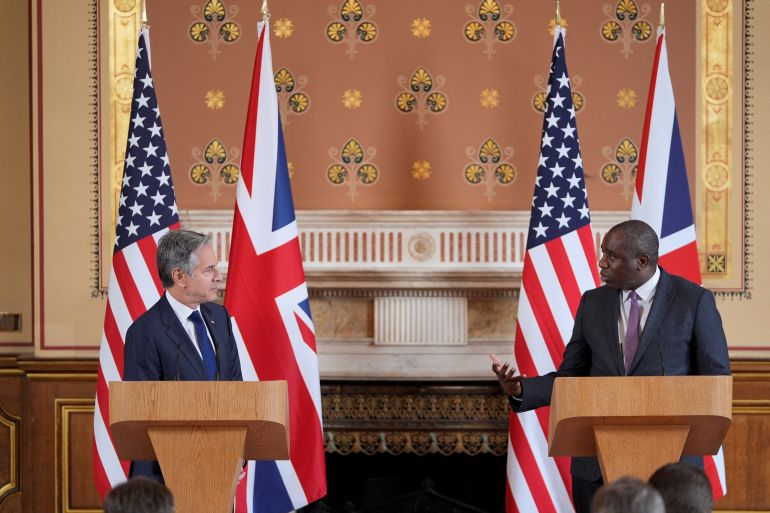US’s Blinken says Russia received ballistic missiles from Iran
UK, France and Germany announce sanctions on Iran as US says it will announce new measures later.
US Secretary of State Antony Blinken and the UK’s Foreign Secretary David Lammy hold a joint news conference in the Locarno room at the Foreign, Commonwealth and Development Office (FCDO) in London, UK [Mark Schiefelbein/Pool via Reuters]Published On 10 Sep 202410 Sep 2024
The United States has formally accused Iran of supplying short-range ballistic missiles to Russia to use in the war in Ukraine and will take measures to punish those involved.
US Secretary of State Antony Blinken, speaking alongside British Foreign Secretary David Lammy during a visit to London, said that US sanctions would be announced later on Tuesday.
“Russia has now received shipments of these ballistic missiles and will likely use them within weeks in Ukraine, against Ukrainians,” Blinken said.
“The supply of Iranian missiles enables Russia to use more of its arsenal for targets that are further from the front line.”
Iran has denied providing Russia with weapons to be used in the war in Ukraine.
“Iran considers the provision of military assistance to the parties engaged in the conflict – which leads to increased human casualties, destruction of infrastructure, and a distancing from ceasefire negotiations – to be inhumane,” a recent statement from Iran’s mission to the United Nations said.
“Thus, not only does Iran abstain from engaging in such actions itself, but it also calls upon other countries to cease the supply of weapons to the sides involved in the conflict.”
“We strongly reject the claims of Iran’s role in exporting arms to one side of the war,” Iranian Ministry of Foreign Affairs spokesperson Nasser Kanaani told a news conference on Monday.
“Iran’s accusers are the ones who are among the biggest arms exporters to one side of the war,” he added, reiterating that Tehran “is not part of the war” in Ukraine.
While Iran sought to deny the report, Kremlin spokesperson Dmitry Peskov failed to follow suit on Monday.
“We have seen this report; it is not every time that this kind of information is true,” he said.
Iran is already one of the most heavily sanctioned countries in the world, and some experts have questioned the benefit of adding more economic penalties.
Additional US sanctions on Iran on Tuesday will include measures against the airline Iran Air, and other countries are also expected to announce new steps, Blinken said.
The governments of France, Germany and the United Kingdom also said they strongly condemn Iranian transfers of ballistic missiles to Russia and declared new sanctions targeting air transport.
“We will be taking immediate steps to cancel bilateral air services agreements with Iran,” the three European countries said in a joint statement, adding that they would also “work towards imposing sanctions on Iran Air”.
While describing sanctions against Iran over the missile deliveries as a “positive step”, Ukrainian top presidential official Andriy Yermak said this was not enough.
“We also need authorisation to use Western weapons against military targets on Russian territory, the provision of longer-range missiles, and the enhancement of our air defence systems,” Yermak said on social media platform X.
The sanctions come as Blinken and Lammy are preparing to make a joint visit Wednesday to Ukraine, where they will meet President Volodymyr Zelenskyy and other senior officials to discuss bolstering the country’s defences.
The accusations about Iranian missiles could embolden Zelenskyy to further ramp up pressure on the US and other allies to allow Ukraine to use Western-supplied missiles to attack deep inside Russia and hit sites from which Moscow launches aerial attacks.
Lammy called the Iranian missile transfers to Russia “a troubling pattern that we’re seeing. It is definitely a significant escalation.”
